Pearl Harbor - Roosevelt Framing
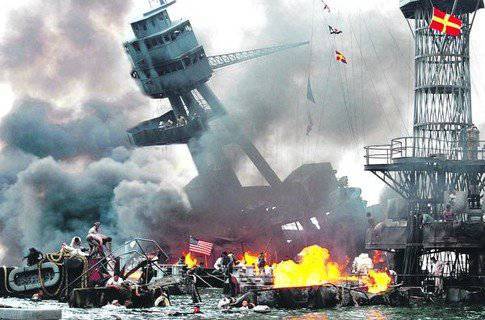
It was in Japanese an incredibly exquisite beginning of the war. On December 7, 1941, Japanese aircraft attacked the American fleet at Pearl Harbor exactly five minutes before the flag was raised. This ceremony was done every day by American sailors on 8 in the morning on all the ships in the harbor of blessed Hawaii at the same time, Guis was raised on the bow and the stars and stripy national flag on the stern. The battleships also played the national anthem on brass instruments sparkling with copper. The sailors' funny caps, whose stomachs had already been digesting the wonderful American breakfast full of fifteen minutes, full of proteins and vitamins, the white uniform of naval officers with wide epaulets, very reminiscent of Russian, the sounds of music - it was a gorgeous start to the day, promising a shore leave (December 7 fell like once a Sunday), and suddenly, at that very moment when everything was ready for the ceremony, Japanese torpedo bombers appeared low over the water.
Subsequently, one of the Japanese pilots, Yoshio Shiga, recalled: “It was a beautiful sight, a view of the American fleet made a deep impression on me. If Japanese ships were camouflaged in dark gray tones, then American shone. I immediately realized that it was easy to attack, and the consequences of the dropped bombs would be serious. ”
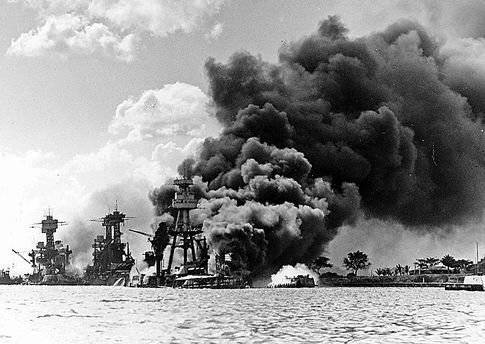
Torpedoes rushed to the American battleships. After 8 minutes, the battleship Oklahoma turned over - the armored giant buried its masts directly into the shallow bottom, with a rounded starboard and part of the keel sticking up on the surface. Four hundred corpses of those who did not have time to jump overboard swam inside.
The battleship "Arizona" exploded, literally scattered into pieces - after hitting a bomb in its cellars, the ammunition detonated. The Lord took 1102 innocent souls to himself in one fell swoop. No one escaped from his team!
Others were lucky a little more. The battleship West Virginia caught fire like a torch and sat down on the bottom - only a small depth of the bay saved him. Directly at the pier sank "California". None of the American battleship, except "Nevada", during the attack did not have time to move. They were all IDEAL fixed targets. Like this, a hunter shoots fat ducks peacefully slumbering on the water.
It was a shame which the American fleet did not know, either before or after. The complete list of losses looked like this - 5 battleships were sunk, three were damaged. Three light cruisers are temporarily disabled. Two destroyers destroyed. Another one is seriously damaged. A large part of the American squadron, which held the entire Pacific Ocean in fear, was turned into a pile of scrap metal in less than an hour.
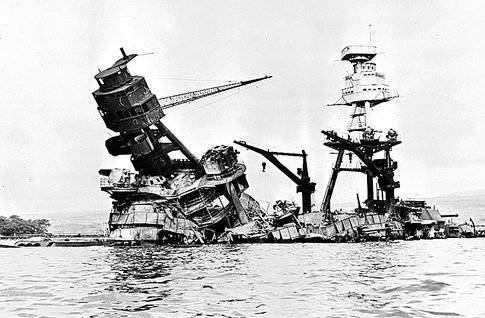
No one guessed that this scrap metal carried a deep symbolic meaning. Just a year before the start of the war, US President Roosevelt banned US firms from exporting scrap metal to Japan. Thus, he deprived this country, which has almost no natural resources, the ability to feed steel with its industry.
However, Roosevelt was an exceptional hypocrite and hypocrite. He even pretended to be in front of his children, playing the good grandfather in a wheelchair, most of all allegedly preoccupied with the freedom of world trade and the image of the United States in narrow, as viewing slits, eyes of the Japanese. President Eliot’s son recalls in his book “By His Eyes” his conversation with his dad in September 1940. Japan waged war in China. The Americans secretly supported Chinese General Chiang Kai-shek. But Eliot Roosevelt was worried why his home country, led by his father, still sells iron scrap to Japan? The son asked his father: “Why? After all, we can not know that the scrap iron sent to Japan, is the death of the Chinese? "
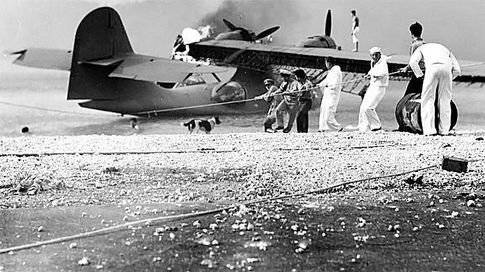
POLICY OF DOUBLE. Old Roosevelt, if you believe his son, allegedly replied, and “thoughtfully”: “We are a peaceful nation. This is not just a state. This is a certain frame of mind. This means that we do not want war; This means that we are not ready for war. Scrap iron is not considered military material. Therefore, Japan, like any other country with which we maintain trade relations, has the full opportunity to buy this material from us. Little of. If we suddenly stopped selling iron scrap to Japan, she would have the right to think that we had committed an unfriendly act, using a trade tool to choke her, to starve her. And that is not all. She would have the right to consider such a move on our part as a basis for breaking off diplomatic relations. I will go even further. If she considered us insufficiently prepared for war, insufficiently armed, she could use this even as a pretext for declaring war. ”
But only a few days after this conversation - 26 of September 1940 of the year - President Roosevelt, on behalf of the American government, announced that it was banning the export of scrap metal, iron and steel to foreign countries, with the exception of Great Britain, Canada and South America. Japan was not included in this list of consumers of American scrap. Consequently, Roosevelt was well aware that forcing her to attack the United States. Moreover, in the same conversation with his son, this prominent japanophobe, who was at the head of the United States, admitted: “In fact, we are engaged in the pacification of Japan. This is a disgusting word, and do not think that I like it. But that is the case. We are appeasing Japan to gain time to create a first-class fleet, a first-class army and first-class aviation. ”
Consequently, Roosevelt believed that 26 was already in September that the fleet, army and aviation had reached that high stage of development, when Japan could no longer be “pacified”, but, on the contrary, irritated.
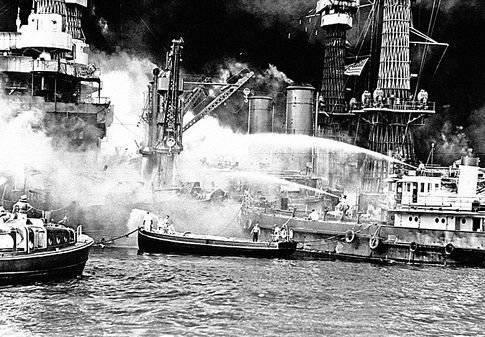
As early as May 16, 1940, at the initiative of the president, a new military program was adopted. Roosevelt was in a hurry. He turned to Congress in those days when it became clear that France was losing the German war. Hitler’s Tanks just broke through the Ardennes to Paris. The president’s first words were: “Hard times are coming.” As he wrote in the book “Lend-Lease - weapon victories, ”one of Roosevelt’s closest associates, Edward Stettinius, who was in charge of mobilizing American industry,“ the president appealed to Congress for two special allocations for army and navy expansion, totaling about $ 2,5 billion. The fate of the Maginot Line, like the five nations that over the past five weeks have learned from their own experience that neutrality and good intentions do not save from aggression, made the president say: “There are no old ways of defense that would be sufficient today and would not need improvement. No one at any time today can ignore the threat of attack. ” He then called the number that caused excitement in Congress and throughout the country: “I would like our country to be able to produce at least 50 000 aircraft per year.”
TANKS AS REFRIGERATORS. It was after this that the Americans began stamping tanks and aircraft like refrigerators. They have chosen a commercially viable scheme. Naturally, no Hitler threatened the United States. Without an ocean fleet, he could not land not only on the American coast, but even in England. In addition, the Germans and Americans were not at war. Only Great Britain fought. And the United States generously supplied her with weapons and equipment, increasing the capacity of its industry to re-equip and deploy a new army. This system was called Lend-Lease. After Hitler’s invasion of the USSR, Roosevelt extended it to his “friend” Stalin. By the end of September 1941, the Soviet Union ordered supplies for the 145 710 823 dollar. According to Stettinius, “Russians bought aviation gasoline, toluene, machinery and equipment, as well as telephone wire, shoes, fabrics, and more. They also needed airplanes, tanks and anti-tank guns. ”
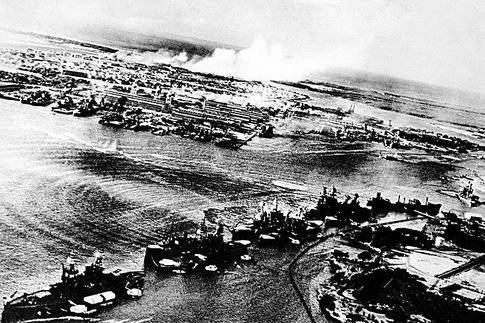
FOOTBALL ROOSEVELT. All this allowed the United States to secretly prepare for war with Japan, stuck in China, and then take the prize in the battle for world domination, landing in Europe at a time when Germany will be exhausted in the confrontation on the Eastern Front. Usually, we remember the cynical phrase of Roosevelt’s heir Harry Harman, who said in 1941 in June: “Let the Russians and the Germans kill each other as much as possible, and we will help them.” But in fact, Truman just voiced conversations from Roosevelt’s inner circle. The president himself told his son in 1942: “Imagine that this is a football match, and we are reserve players sitting on the bench. At the moment, the main players are Russians, Chinese and, to a lesser extent, the British. We are assigned the role of ... players who will enter the game at a crucial moment ... We will enter the game to score the decisive goal. "
It is not necessary to think that Roosevelt was a philanthropist who was going to save the world out of a desire to take the most honorable place in paradise. America provided assistance to the Allies only for money and recognition of her vision of the future world order. The USA twisted their hands even historical ancestral home - Great Britain. Roosevelt demanded that Churchill open the way for American goods to British colonies. The fat man rested with a cigar: “Mr. President, England does not intend for a minute to abandon its pre-eminence in the British dominions. The trade that brought greatness to England will continue on the terms established by the British ministers. ” But the American president continued to stubbornly educate his British counterpart: "Somewhere along this line you and I may have some disagreements."
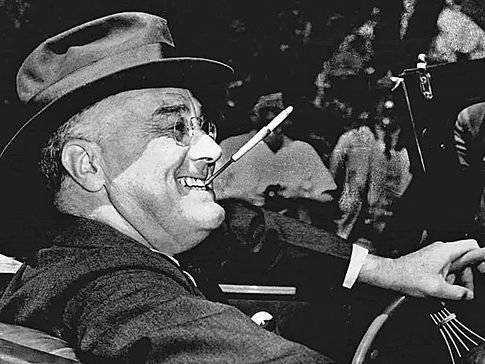
Disagreements were overcome only by 13 August 1941 of the year on board the American cruiser Augusta, where, right in the ocean, the famous Atlantic Charter was signed. The fourth, most important point of it was: the United States and Great Britain "would strive to ensure that all countries, great or small, winners or losers, would have equal access to trade and to world raw materials." In practice, these beautiful words meant that the world's raw materials should go to the strongest - that is, the United States of America. The hidden irony of the document was that less than three weeks before the conclusion of the Atlantic Charter 26 in July 1941, the United States, Britain and the Netherlands declared the Japanese capital freeze and banned the export of oil and even oil products to Japan - from its territory, where wide oil production, and the British and the Dutch - from their colonies in Southeast Asia. What kind of “free trade” could we talk about?
Roosevelt suggested that a small island country either suffocate in the grip of an economic blockade, or try its luck in a suicidal war against the United States and Great Britain. The Japanese could not lose face and chose war. American sailors, who saw the dawn at Pearl Harbor 7 December 1941 for the last time in their lives, could thank only their President, who measured the world with the measures of big profits. They were pawns in a big geopolitical game that had to be “passed” in order to cause an explosion of “righteous anger” among American housewives and their sons zombied by “ideals of democracy”.
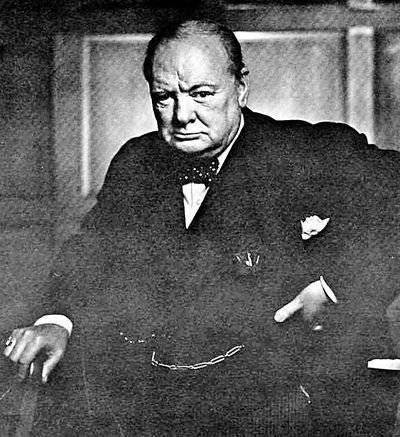
REVENGE USA. However, Pearl Harbor paradoxically went to the benefit of the American fleet. Irrevocably, he lost only two battleships - "Oklahoma" and "Arizona". All the other “shortages” throughout 1942 year were not only raised and repaired, but also radically modernized. By a happy coincidence, the base itself and its shipbuilding potential did not suffer.
Revenge for Pearl Harbor occurred on the night of 24 on 25 of October 1944 of the year in Leyte Gulf in the Philippines. The American squadron, led by Rear Admiral Oldendorf (a descendant of German émigrés), encountered two Japanese battleships, four cruisers and eight destroyers. The Japanese ships slowly passed through the narrow Surigao Strait, having no radar and not suspecting that an American admiral of German origin sees them in the dark at a glance. Oldendorff’s battle line consisted entirely of the resurrected “dead” Pearl Harbor — the battleships West Virginia, Maryland, Tennessee, California and Pennsylvania. The flagship battleship of Admiral Nishimura "Jaamashiro" broke in half. Following him, the battleship Fuso was sent to the bottom. The whole fight took only ten minutes. The battleship "Pennsylvania", which closed the line, did not even have time to launch a single projectile. All targets were hit in pitch darkness according to the indications of locators.
Franklin Roosevelt’s provocative calculation, who had lured the Japanese into the Pearl Harbor trap three years before, was fully justified. Sly and strong defeated the desperate and brave. Pearl Harbor's bloody morning was in fact the heyday of American world domination.
Information